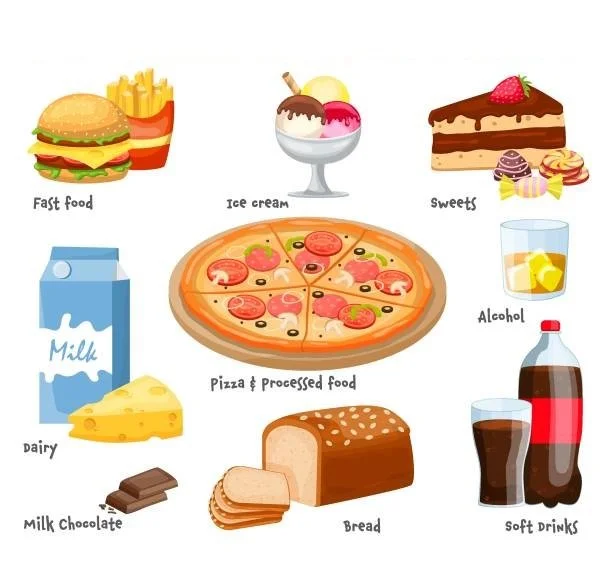What Are Common Food Triggers for Inflammation?
Inflammation food triggers, Inflammation is the body’s way of protecting itself from harm, like infections or injuries. However, when inflammation becomes a long-term issue, it can lead to serious health problems like heart disease, arthritis, and even some types of cancer. One of the biggest factors that can cause inflammation is the food we eat. In this blog, we’ll talk about common food triggers for inflammation and how you can make better choices to keep your body healthy.
What Is Inflammation and Why Does It Matter?
Inflammation is your body’s natural defense mechanism. It helps to heal wounds and fight off infections. But when inflammation lasts for a long time, it can damage your body’s tissues and organs, leading to chronic health conditions. What you eat can either increase or decrease inflammation in your body, so it’s important to know which foods to avoid.
How Diet Affects Inflammation
The food you eat plays a huge role in whether your body experiences more or less inflammation. Some foods can make inflammation worse, while others can help reduce it. By being aware of these food triggers, you can make smarter choices that will keep you feeling your best.
Common Food Triggers for Inflammation
1. Refined Carbohydrates
Refined carbohydrates like white bread, pastries, and many processed foods can cause inflammation. These foods have a high glycemic index, which means they cause your blood sugar to spike quickly. This rapid increase in blood sugar can lead to inflammation over time. Eating too many refined carbs can also increase your risk of developing conditions like diabetes and heart disease.
2. Sugar and High-Fructose Corn Syrup
Sugar is one of the biggest culprits when it comes to inflammation, especially when consumed in large amounts. Sugary drinks, snacks, and desserts can all trigger inflammation. High-fructose corn syrup, a common ingredient in many processed foods and soft drinks, is particularly bad for inflammation. Cutting back on added sugars can help reduce inflammation and lower your risk of chronic diseases.
3. Trans Fats
Trans fats are found in many fried and processed foods, like margarine, baked goods, and fast food. These fats are not only bad for your heart but also increase inflammation in your body. Avoiding trans fats is essential for reducing inflammation and protecting your heart health.
4.Processed and Red Meats
Processed meats like sausages, bacon, and deli meats, as well as red meats, can contribute to inflammation. These meats are high in saturated fats and preservatives, which can trigger an inflammatory response in your body. Eating too industrial farmed red meat can also lead to the buildup of harmful compounds when it’s cooked at high temperatures, further increasing inflammation.
5. Omega-6 Fatty Acids
Omega-6 fatty acids are essential fats that your body needs, but too much can cause inflammation. These fats are found in many vegetable oils, such as corn, canola and soybean oil, which are often used in processed foods. To reduce inflammation, it’s important to balance omega-6 fatty acids with omega-3 fatty acids, which are found in foods like fish, flaxseeds, and walnuts.
6. Dairy Products
Dairy products like milk, cheese, and yogurt can cause inflammation in some people, especially those who are lactose intolerant or sensitive to dairy proteins. If you notice that dairy products cause digestive discomfort or other symptoms, it might be contributing to inflammation in your body.
7. Alcohol
Drinking too much alcohol can irritate your digestive system and lead to inflammation. Over time, excessive alcohol consumption can cause chronic inflammation that affects your liver, pancreas, and heart. Limiting alcohol intake is an important step in reducing inflammation and improving your overall health.
8. Gluten
Gluten, a protein found in wheat, barley, and rye, can trigger inflammation in people with celiac disease or gluten sensitivity. If you have a gluten-related disorder, consuming gluten can cause your immune system to attack your body’s own tissues, leading to inflammation and symptoms like bloating and fatigue. Instead choose a non-gluten alternative such as buckwheat or quinoa which are both complete proteins and helpful in balancing blood sugars.
How to Reduce Inflammation with Your Diet
Reducing inflammation involves avoiding foods that trigger it and adding more anti-inflammatory foods to your diet. Here are some of the best foods to include:
Fruits and Vegetables: These are packed with antioxidants that fight inflammation. Try to eat a variety of colorful fruits and veggies like berries, leafy greens, and broccoli.
Fatty Fish: Fish like salmon, mackerel, and sardines are rich in omega-3 fatty acids, which help reduce inflammation.
Whole Grains: Foods like oats, quinoa, and brown rice are high in fiber and nutrients that can help lower inflammation.
Nuts and Seeds: Almonds, walnuts, and chia seeds are great sources of healthy fats that combat inflammation.
Herbs and Spices: Turmeric, ginger, and garlic have powerful anti-inflammatory properties and can easily be added to your meals.
Conclusion: Take Control of Your Health with Bar1Wellness
Knowing which foods trigger inflammation is the first step in improving your diet and overall health. By avoiding these inflammatory foods and incorporating more anti-inflammatory options into your meals, you can reduce your risk of chronic inflammation and related health issues.
At Bar1Wellness, we’re here to help you on your journey to better health. Our wellness programs are designed to give you the knowledge and tools you need to make healthy choices. Whether you want to reduce inflammation, lose weight, or simply eat healthier, Bar1Wellness is here to support you every step of the way.



